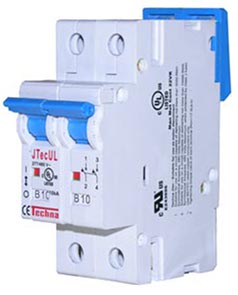Circuit breaker help
I was thinking today and came to the conclusion that a basic circuit breaker consumes X amount of power.

My gut feeling is that the circuit breaker consumes a very small amount of power but this value should increase as the current rating of the breaker is approached. If I understand it correctly a 10 amp breaker would be less efficient if the load was approaching 8 amps vs. more efficient if the load was floating around .5 amp. Is this logic correct? How do you get a energy spec on Circuit breakers? Can it be measured simply - I am considering simply using a DMM but it may require some extra hardware for safety reasons.
Please feel me in on this .

My gut feeling is that the circuit breaker consumes a very small amount of power but this value should increase as the current rating of the breaker is approached. If I understand it correctly a 10 amp breaker would be less efficient if the load was approaching 8 amps vs. more efficient if the load was floating around .5 amp. Is this logic correct? How do you get a energy spec on Circuit breakers? Can it be measured simply - I am considering simply using a DMM but it may require some extra hardware for safety reasons.
Please feel me in on this .


Comments
See
http://en.wikipedia.org/wiki/Circuit_breaker
http://upload.wikimedia.org/wikipedia/commons/c/c1/Circuitbreaker.jpg
etc
The simplest meter-check will be a simple resistance one, as the sense element you can see in the image is a few turns of high current wire making a simple trigger solenoid (and/or a bimetalic strip that self heats, for slower sensing).
Next, you could measure the voltage drop across the Breaker, at the load region you are interested in.
If a device drew, say, 1 watt, it would be warm. My router draws 4 watts and is warm. I have an older router that draws 12W and that really is almost hot.
I've got a switchboard with some breakers that are 20A and I checked them the other day with 15A going through and they didn't seem warm, so I would guess if they are using power it is a pretty tiny amount. Resistance in wires is another load possibly worth thinking about - I've noticed some thin 10A extension leads can get warm.
'
Motor/inductive breakers are way different than regular resistive thermo trip breakers.
'
A high efficiency motor with a letter code of "H" or higher will need a lot of instantaneous current to start the motor.
'
This will lead to a breaker rating 2 to 3 times the rated F.L.A. of the motor.
You're probably right that using a larger breaker may save a little bit of power, but then the copper cross section also has to be suitably larger too, to match.
And the phrase is "fill me in" : )
Not to mention that almost EVERY single electrical or electronic product you purchase these days always uses a small amount of electricity when "off" (remote control or electronic controls instead of an old fashioned mechanical on/off switch.)
I rewired my house and/or placed switches on things or placed electronics on power strips with an on/off switch (no power "indicator light" type power strips of course). Basically everything in my house is totally OFF if it is not in use. And doing that saved me about $10 a month on my electric bill. (Or $120 a year!)
I also get a bit more exercise getting up to manually turn on/off the TV or whatever - my doctor likes that!
All this talk of circuit breakers consuming a bit of power got me thinking of switching to simple fuses. But they too get hotter and hotter as the load creeps closer to their limit... then they melt.
I think it is time to re-read Walden's chapter on economy. Just use less and use with a purpose. If you need air conditioning (like I do), just live in a smaller space that is well-insulated and use the a/c.
I actually run my a/c during the hot season 24/7 because the monthly electric bill is less than when I turned it off when I was out and on when I return. It seems the concrete walls would heat up and require more energy to get cool again, but are fine as insulation. Of course, I don't run the thing at 20 degrees C, I run it at 27 degrees C and therein lies a huge savings. Just because I have a cooling device doesn't mean I have to make it winter indoors.
I refuse to have a refigerator because it is a big waste of energy. And use a tiny on demand hot water heater for showers.
Dr. Acula is right about how hot is something. Power consumption just has to follow the laws of thermodynamics.